Detailed Case Study: Hawkins v Clayton on Pure Economic Loss
VerifiedAdded on 2021/06/14
|13
|982
|25
Case Study
AI Summary
This case study analyzes the landmark case of Hawkins v Clayton [1988] HCA 15, which deals with the law of negligence, specifically focusing on pure economic loss and the duty of care owed by solicitors. The case revolves around a solicitor's failure to inform the beneficiary of a will about its existence, leading to financial loss. The analysis examines the facts, issues raised by both the plaintiff and the defendant, and the arguments presented. The judgment of the court, which favored the plaintiff, is explored, highlighting the court's consideration of the solicitor-client relationship and the concept of proximity. The case study references relevant legal principles and precedents, including San Sebastian Pty Ltd v Minister and Shire of Sutherland v Heyman, to illustrate the court's reasoning and the development of the law of negligence in this area. The conclusion summarizes the High Court's ruling and its implications for solicitors' responsibilities in handling wills and protecting beneficiaries' interests.
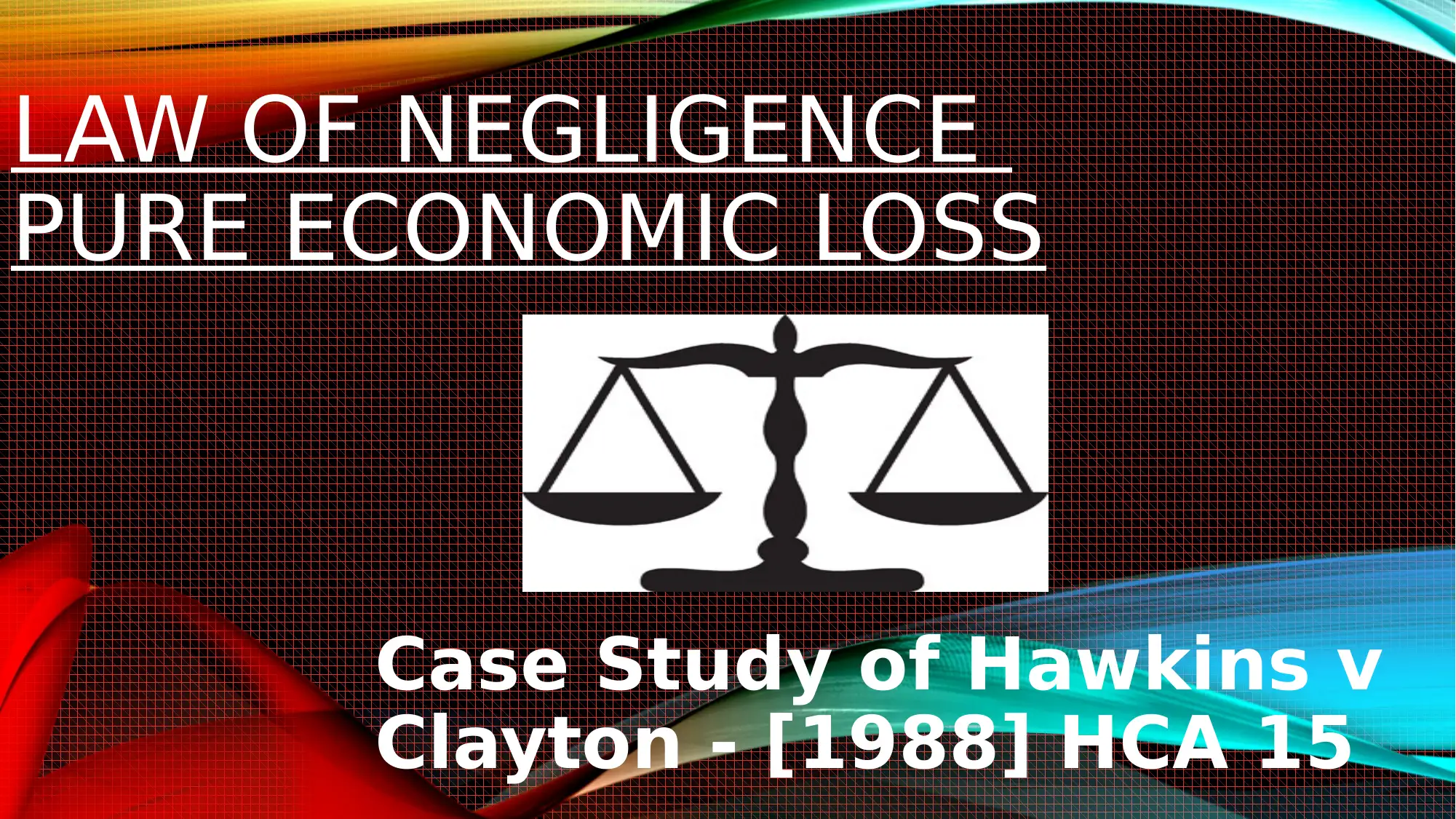
LAW OF NEGLIGENCE
PURE ECONOMIC LOSS
Case Study of Hawkins v
Clayton - [1988] HCA 15
PURE ECONOMIC LOSS
Case Study of Hawkins v
Clayton - [1988] HCA 15
Paraphrase This Document
Need a fresh take? Get an instant paraphrase of this document with our AI Paraphraser
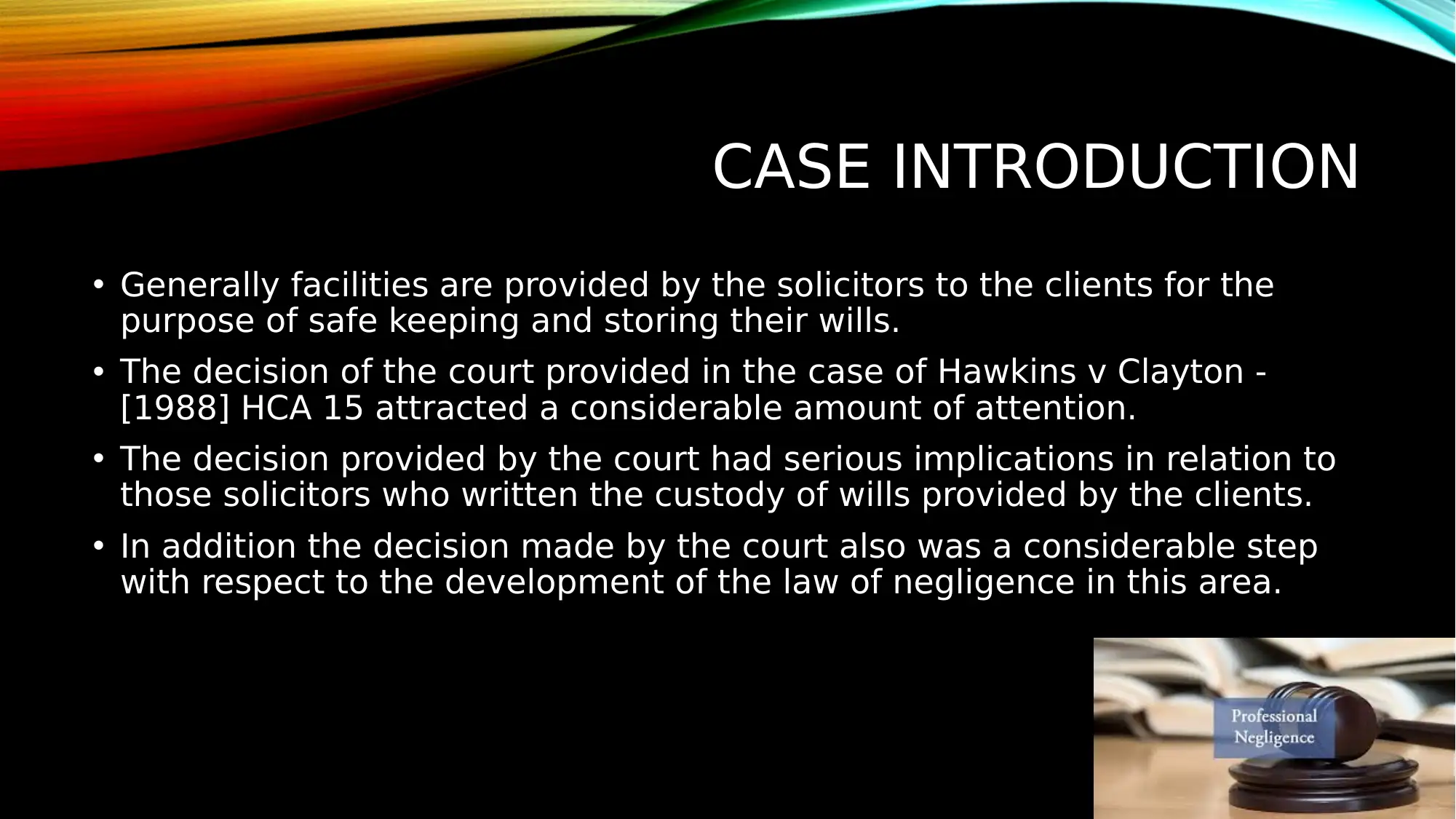
CASE INTRODUCTION
• Generally facilities are provided by the solicitors to the clients for the
purpose of safe keeping and storing their wills.
• The decision of the court provided in the case of Hawkins v Clayton -
[1988] HCA 15 attracted a considerable amount of attention.
• The decision provided by the court had serious implications in relation to
those solicitors who written the custody of wills provided by the clients.
• In addition the decision made by the court also was a considerable step
with respect to the development of the law of negligence in this area.
• Generally facilities are provided by the solicitors to the clients for the
purpose of safe keeping and storing their wills.
• The decision of the court provided in the case of Hawkins v Clayton -
[1988] HCA 15 attracted a considerable amount of attention.
• The decision provided by the court had serious implications in relation to
those solicitors who written the custody of wills provided by the clients.
• In addition the decision made by the court also was a considerable step
with respect to the development of the law of negligence in this area.
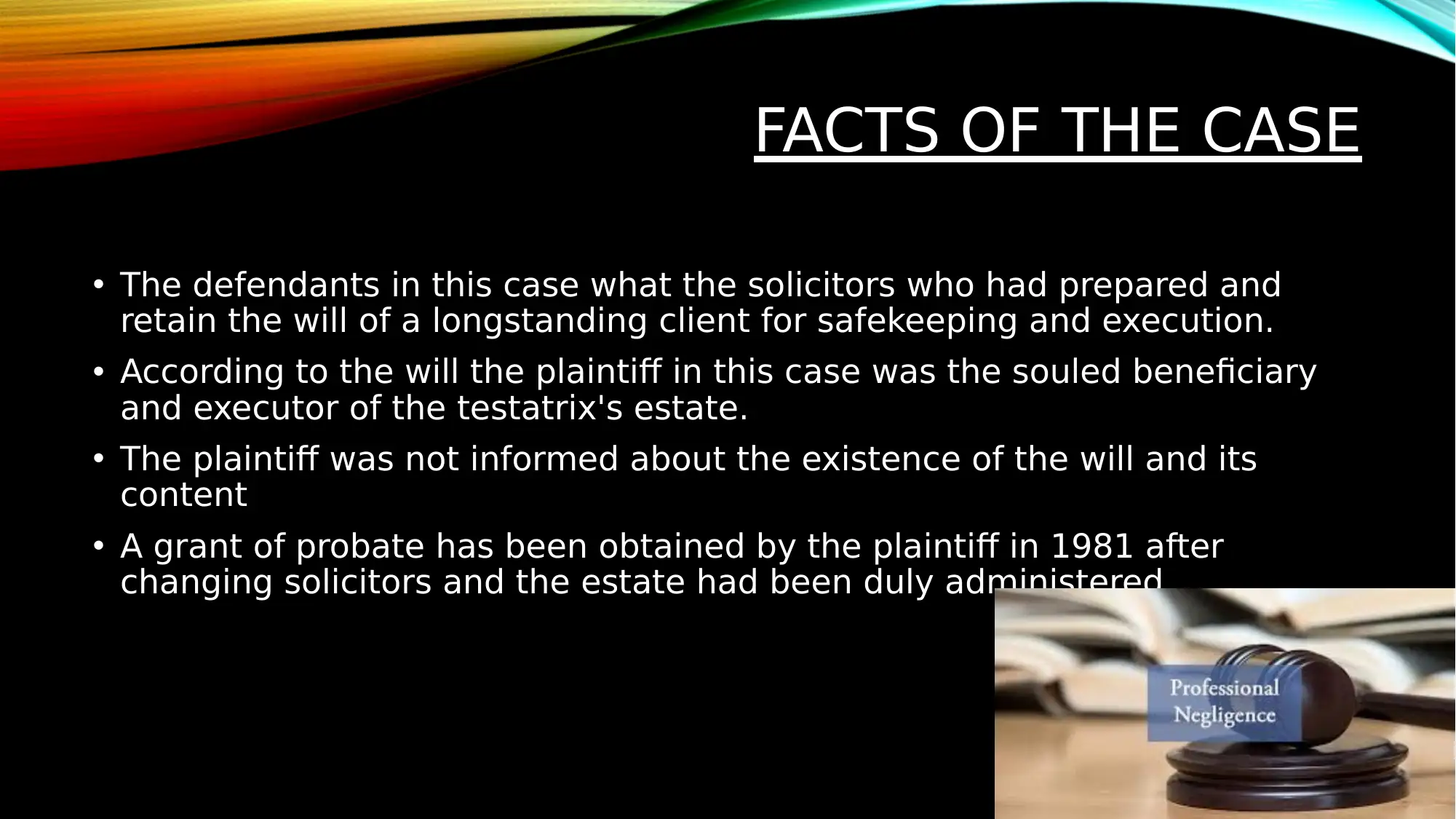
FACTS OF THE CASE
• The defendants in this case what the solicitors who had prepared and
retain the will of a longstanding client for safekeeping and execution.
• According to the will the plaintiff in this case was the souled beneficiary
and executor of the testatrix's estate.
• The plaintiff was not informed about the existence of the will and its
content
• A grant of probate has been obtained by the plaintiff in 1981 after
changing solicitors and the estate had been duly administered
• The defendants in this case what the solicitors who had prepared and
retain the will of a longstanding client for safekeeping and execution.
• According to the will the plaintiff in this case was the souled beneficiary
and executor of the testatrix's estate.
• The plaintiff was not informed about the existence of the will and its
content
• A grant of probate has been obtained by the plaintiff in 1981 after
changing solicitors and the estate had been duly administered
⊘ This is a preview!⊘
Do you want full access?
Subscribe today to unlock all pages.

Trusted by 1+ million students worldwide
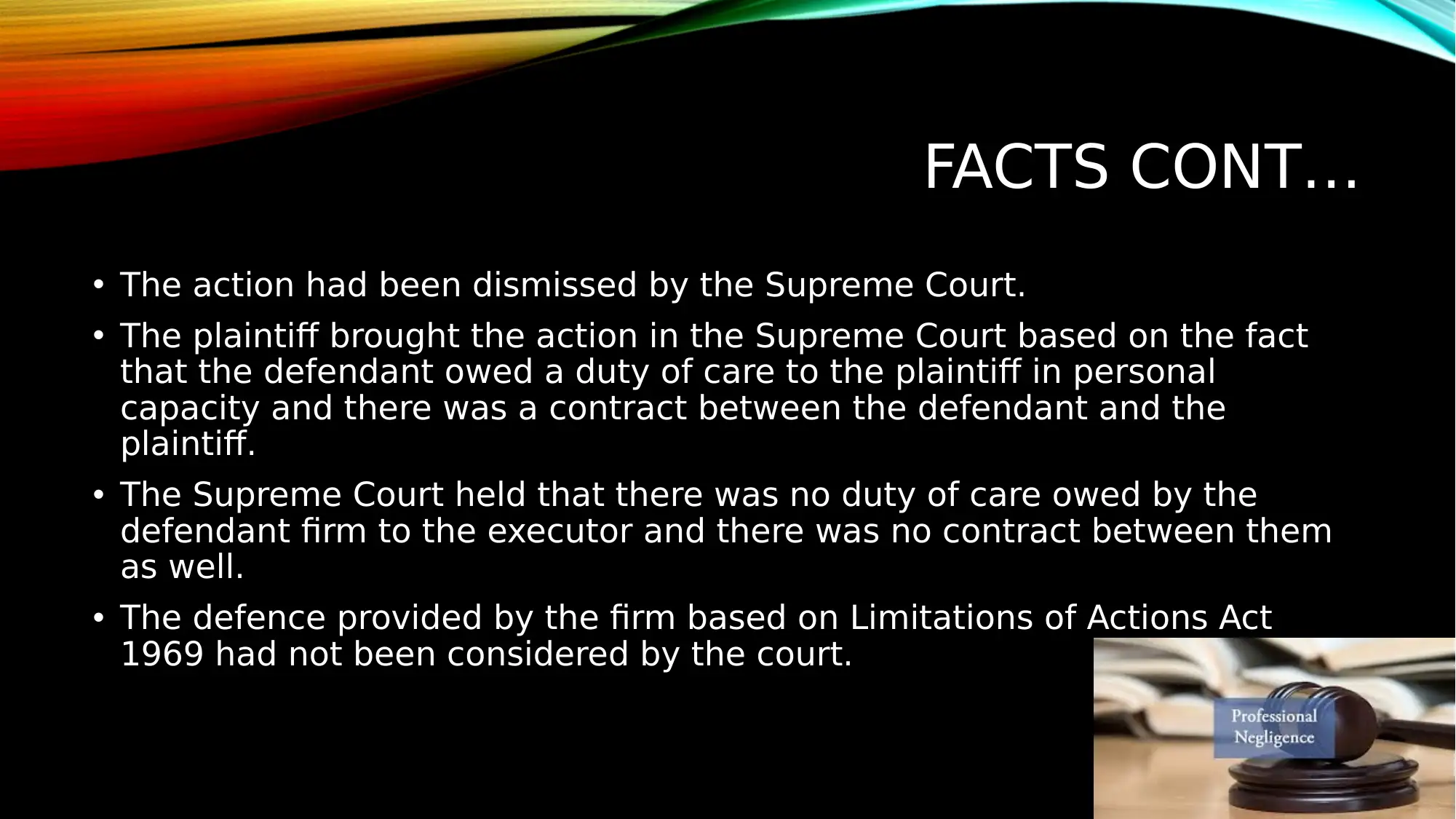
FACTS CONT…
• The action had been dismissed by the Supreme Court.
• The plaintiff brought the action in the Supreme Court based on the fact
that the defendant owed a duty of care to the plaintiff in personal
capacity and there was a contract between the defendant and the
plaintiff.
• The Supreme Court held that there was no duty of care owed by the
defendant firm to the executor and there was no contract between them
as well.
• The defence provided by the firm based on Limitations of Actions Act
1969 had not been considered by the court.
• The action had been dismissed by the Supreme Court.
• The plaintiff brought the action in the Supreme Court based on the fact
that the defendant owed a duty of care to the plaintiff in personal
capacity and there was a contract between the defendant and the
plaintiff.
• The Supreme Court held that there was no duty of care owed by the
defendant firm to the executor and there was no contract between them
as well.
• The defence provided by the firm based on Limitations of Actions Act
1969 had not been considered by the court.
Paraphrase This Document
Need a fresh take? Get an instant paraphrase of this document with our AI Paraphraser
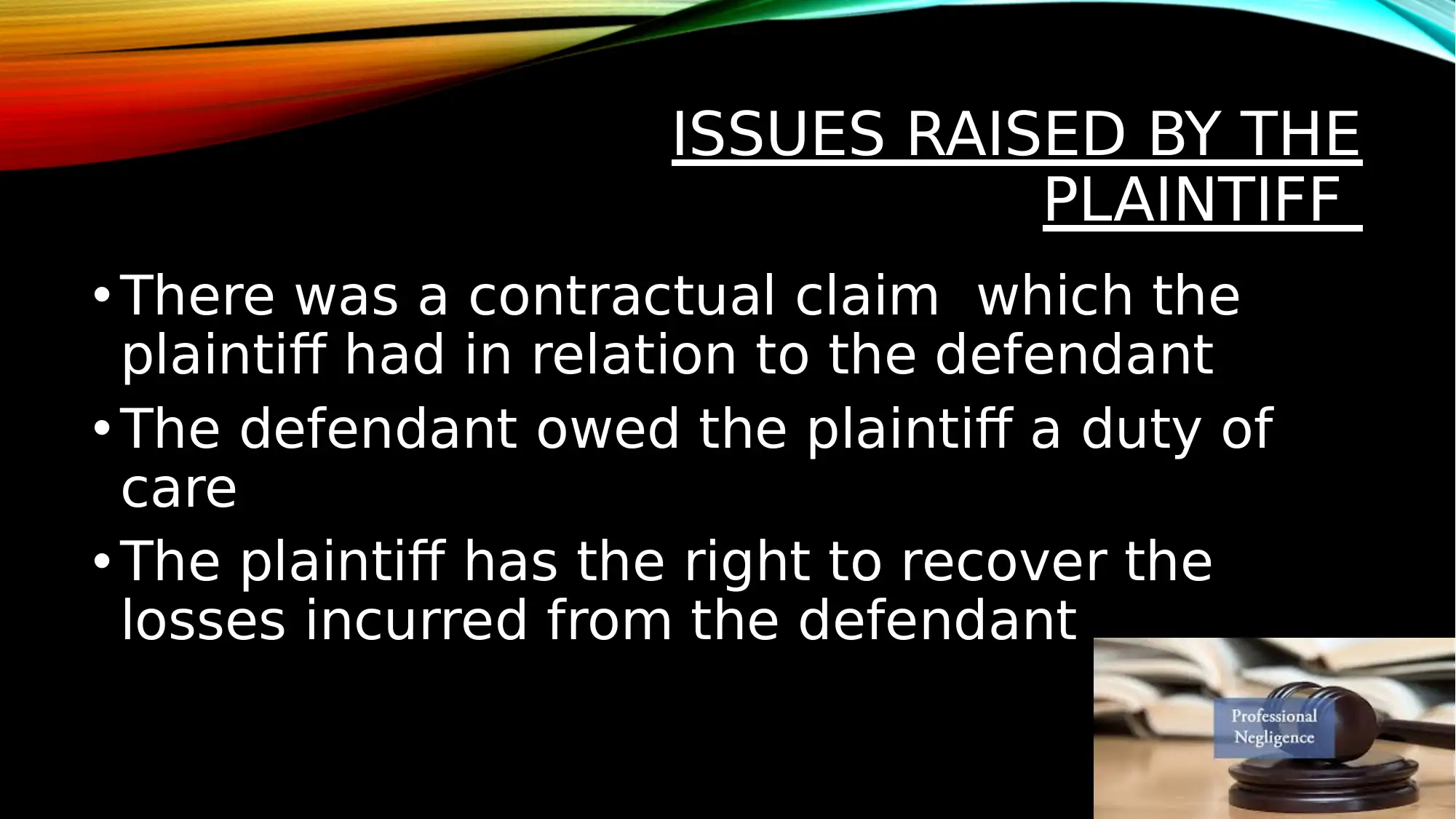
ISSUES RAISED BY THE
PLAINTIFF
• There was a contractual claim which the
plaintiff had in relation to the defendant
• The defendant owed the plaintiff a duty of
care
• The plaintiff has the right to recover the
losses incurred from the defendant
PLAINTIFF
• There was a contractual claim which the
plaintiff had in relation to the defendant
• The defendant owed the plaintiff a duty of
care
• The plaintiff has the right to recover the
losses incurred from the defendant
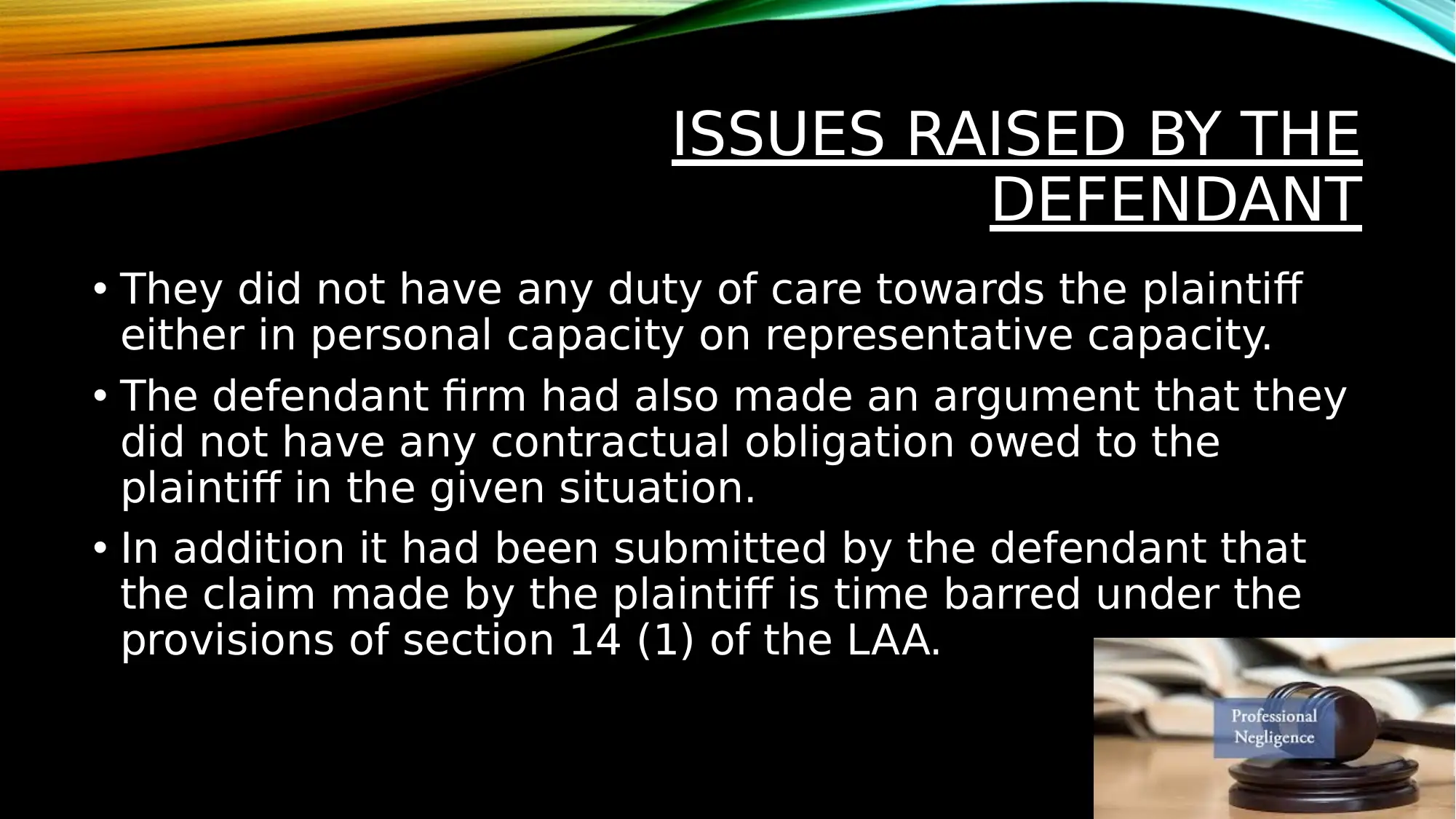
ISSUES RAISED BY THE
DEFENDANT
• They did not have any duty of care towards the plaintiff
either in personal capacity on representative capacity.
• The defendant firm had also made an argument that they
did not have any contractual obligation owed to the
plaintiff in the given situation.
• In addition it had been submitted by the defendant that
the claim made by the plaintiff is time barred under the
provisions of section 14 (1) of the LAA.
DEFENDANT
• They did not have any duty of care towards the plaintiff
either in personal capacity on representative capacity.
• The defendant firm had also made an argument that they
did not have any contractual obligation owed to the
plaintiff in the given situation.
• In addition it had been submitted by the defendant that
the claim made by the plaintiff is time barred under the
provisions of section 14 (1) of the LAA.
⊘ This is a preview!⊘
Do you want full access?
Subscribe today to unlock all pages.

Trusted by 1+ million students worldwide
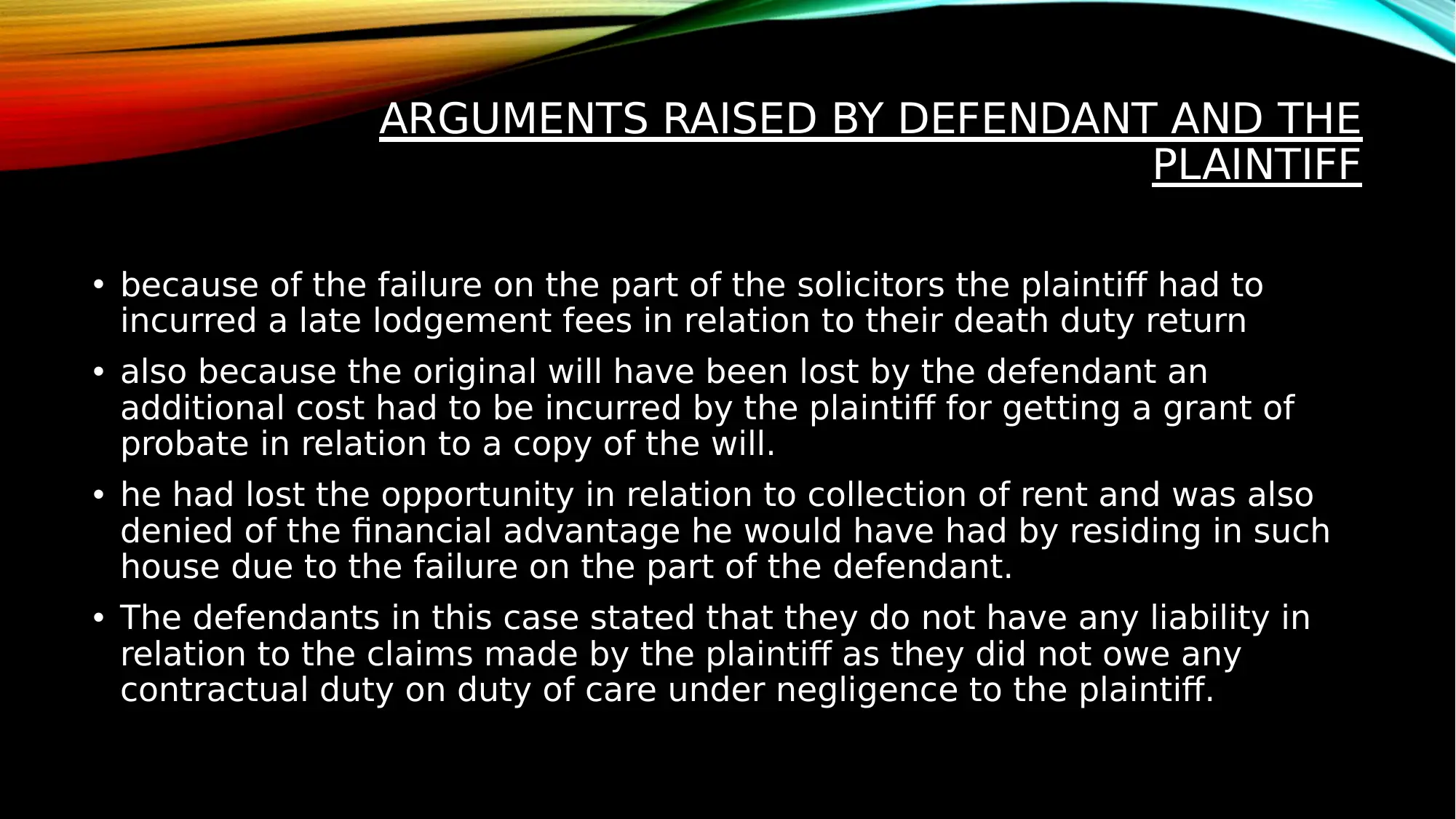
ARGUMENTS RAISED BY DEFENDANT AND THE
PLAINTIFF
• because of the failure on the part of the solicitors the plaintiff had to
incurred a late lodgement fees in relation to their death duty return
• also because the original will have been lost by the defendant an
additional cost had to be incurred by the plaintiff for getting a grant of
probate in relation to a copy of the will.
• he had lost the opportunity in relation to collection of rent and was also
denied of the financial advantage he would have had by residing in such
house due to the failure on the part of the defendant.
• The defendants in this case stated that they do not have any liability in
relation to the claims made by the plaintiff as they did not owe any
contractual duty on duty of care under negligence to the plaintiff.
PLAINTIFF
• because of the failure on the part of the solicitors the plaintiff had to
incurred a late lodgement fees in relation to their death duty return
• also because the original will have been lost by the defendant an
additional cost had to be incurred by the plaintiff for getting a grant of
probate in relation to a copy of the will.
• he had lost the opportunity in relation to collection of rent and was also
denied of the financial advantage he would have had by residing in such
house due to the failure on the part of the defendant.
• The defendants in this case stated that they do not have any liability in
relation to the claims made by the plaintiff as they did not owe any
contractual duty on duty of care under negligence to the plaintiff.
Paraphrase This Document
Need a fresh take? Get an instant paraphrase of this document with our AI Paraphraser
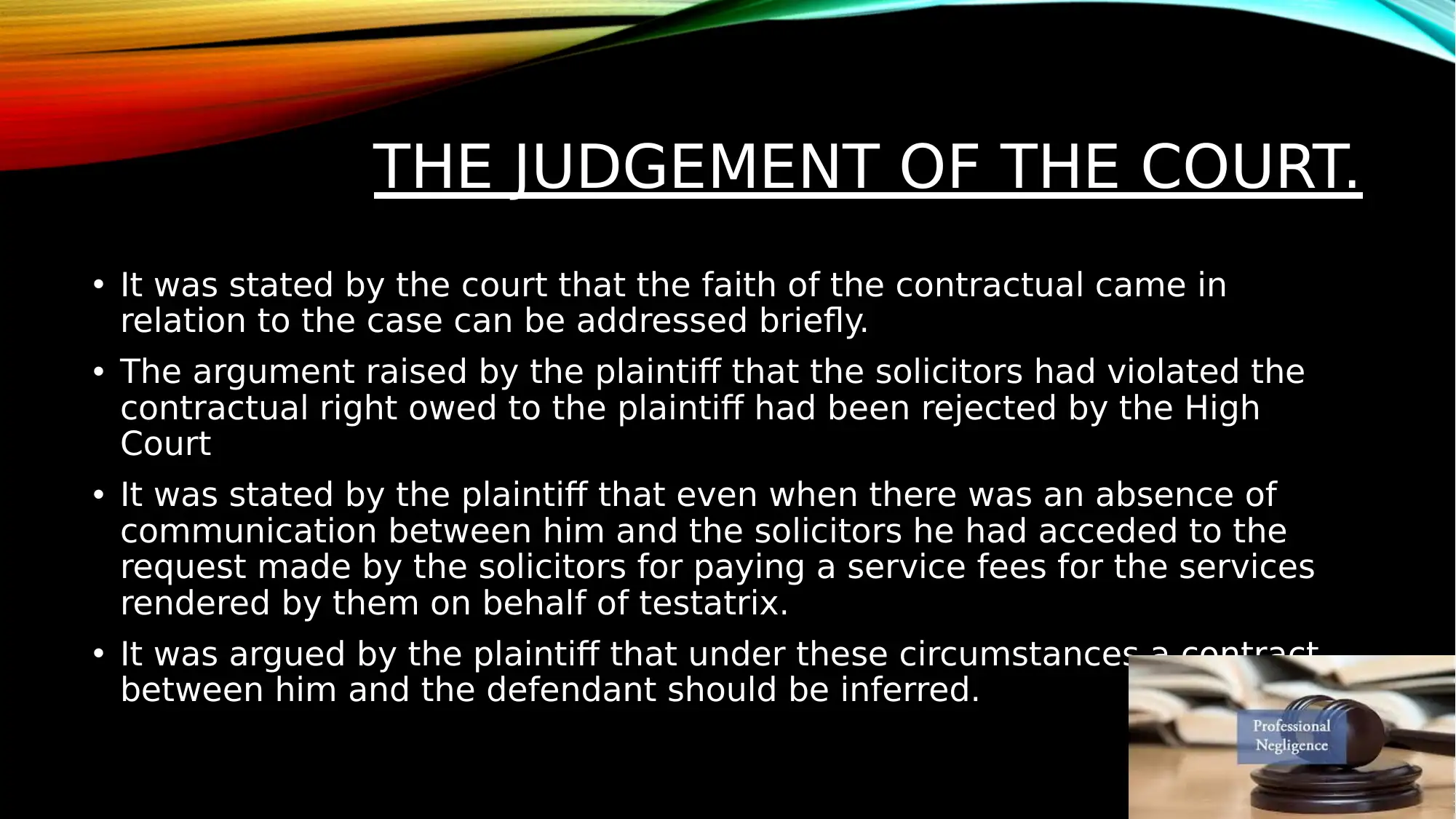
THE JUDGEMENT OF THE COURT.
• It was stated by the court that the faith of the contractual came in
relation to the case can be addressed briefly.
• The argument raised by the plaintiff that the solicitors had violated the
contractual right owed to the plaintiff had been rejected by the High
Court
• It was stated by the plaintiff that even when there was an absence of
communication between him and the solicitors he had acceded to the
request made by the solicitors for paying a service fees for the services
rendered by them on behalf of testatrix.
• It was argued by the plaintiff that under these circumstances a contract
between him and the defendant should be inferred.
• It was stated by the court that the faith of the contractual came in
relation to the case can be addressed briefly.
• The argument raised by the plaintiff that the solicitors had violated the
contractual right owed to the plaintiff had been rejected by the High
Court
• It was stated by the plaintiff that even when there was an absence of
communication between him and the solicitors he had acceded to the
request made by the solicitors for paying a service fees for the services
rendered by them on behalf of testatrix.
• It was argued by the plaintiff that under these circumstances a contract
between him and the defendant should be inferred.
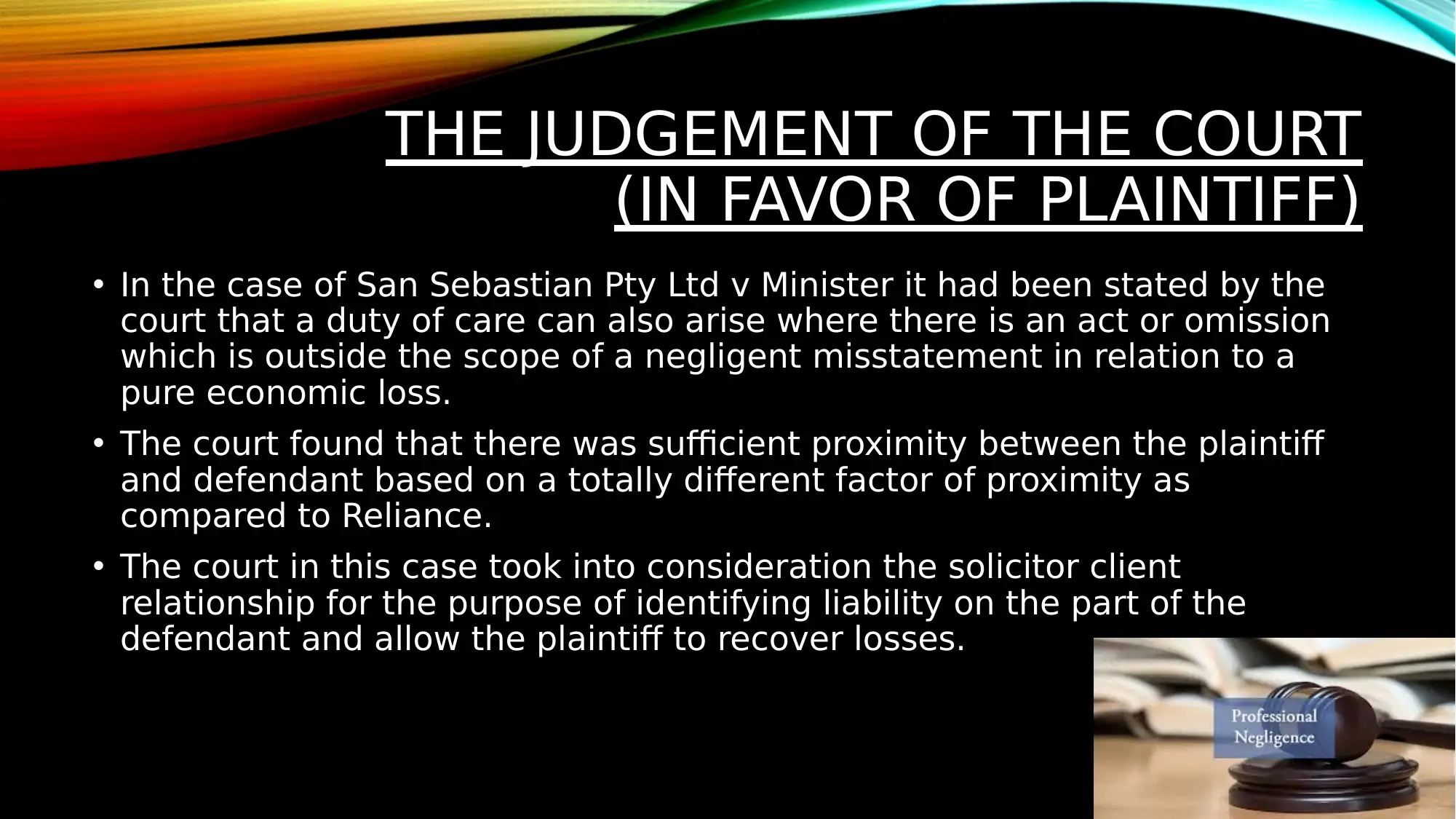
THE JUDGEMENT OF THE COURT
(IN FAVOR OF PLAINTIFF)
• In the case of San Sebastian Pty Ltd v Minister it had been stated by the
court that a duty of care can also arise where there is an act or omission
which is outside the scope of a negligent misstatement in relation to a
pure economic loss.
• The court found that there was sufficient proximity between the plaintiff
and defendant based on a totally different factor of proximity as
compared to Reliance.
• The court in this case took into consideration the solicitor client
relationship for the purpose of identifying liability on the part of the
defendant and allow the plaintiff to recover losses.
(IN FAVOR OF PLAINTIFF)
• In the case of San Sebastian Pty Ltd v Minister it had been stated by the
court that a duty of care can also arise where there is an act or omission
which is outside the scope of a negligent misstatement in relation to a
pure economic loss.
• The court found that there was sufficient proximity between the plaintiff
and defendant based on a totally different factor of proximity as
compared to Reliance.
• The court in this case took into consideration the solicitor client
relationship for the purpose of identifying liability on the part of the
defendant and allow the plaintiff to recover losses.
⊘ This is a preview!⊘
Do you want full access?
Subscribe today to unlock all pages.

Trusted by 1+ million students worldwide
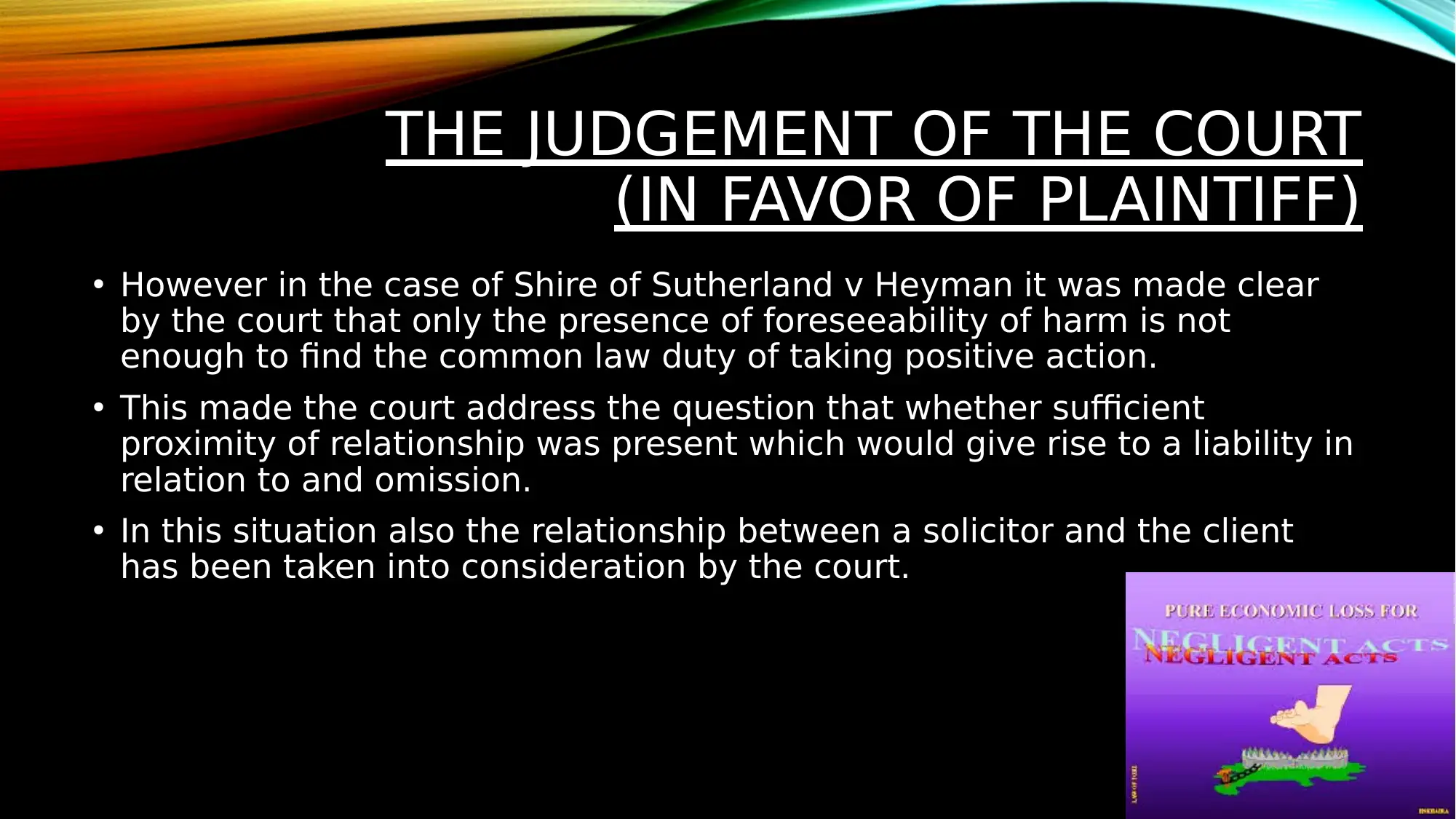
THE JUDGEMENT OF THE COURT
(IN FAVOR OF PLAINTIFF)
• However in the case of Shire of Sutherland v Heyman it was made clear
by the court that only the presence of foreseeability of harm is not
enough to find the common law duty of taking positive action.
• This made the court address the question that whether sufficient
proximity of relationship was present which would give rise to a liability in
relation to and omission.
• In this situation also the relationship between a solicitor and the client
has been taken into consideration by the court.
(IN FAVOR OF PLAINTIFF)
• However in the case of Shire of Sutherland v Heyman it was made clear
by the court that only the presence of foreseeability of harm is not
enough to find the common law duty of taking positive action.
• This made the court address the question that whether sufficient
proximity of relationship was present which would give rise to a liability in
relation to and omission.
• In this situation also the relationship between a solicitor and the client
has been taken into consideration by the court.
Paraphrase This Document
Need a fresh take? Get an instant paraphrase of this document with our AI Paraphraser
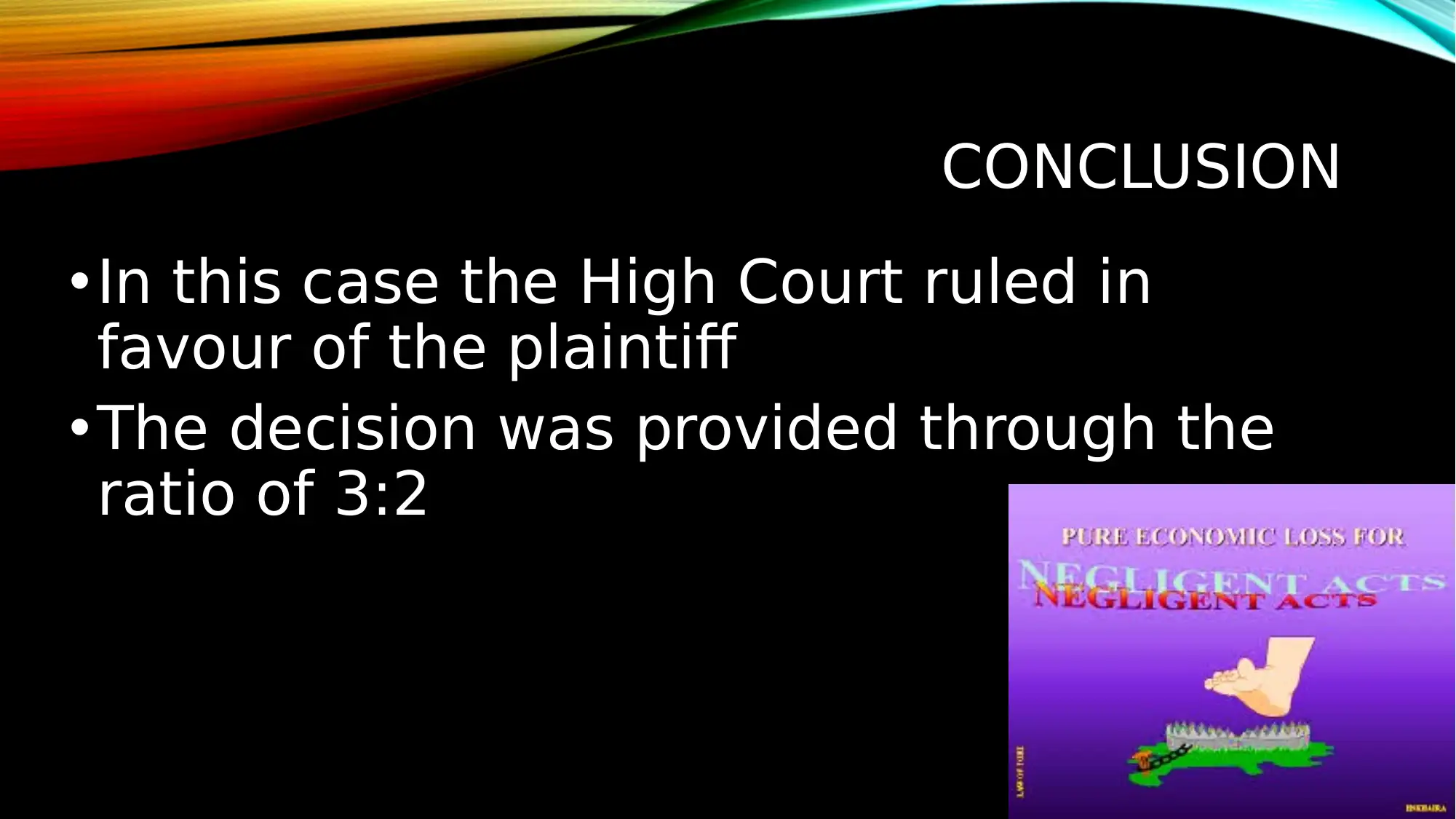
CONCLUSION
•In this case the High Court ruled in
favour of the plaintiff
•The decision was provided through the
ratio of 3:2
•In this case the High Court ruled in
favour of the plaintiff
•The decision was provided through the
ratio of 3:2
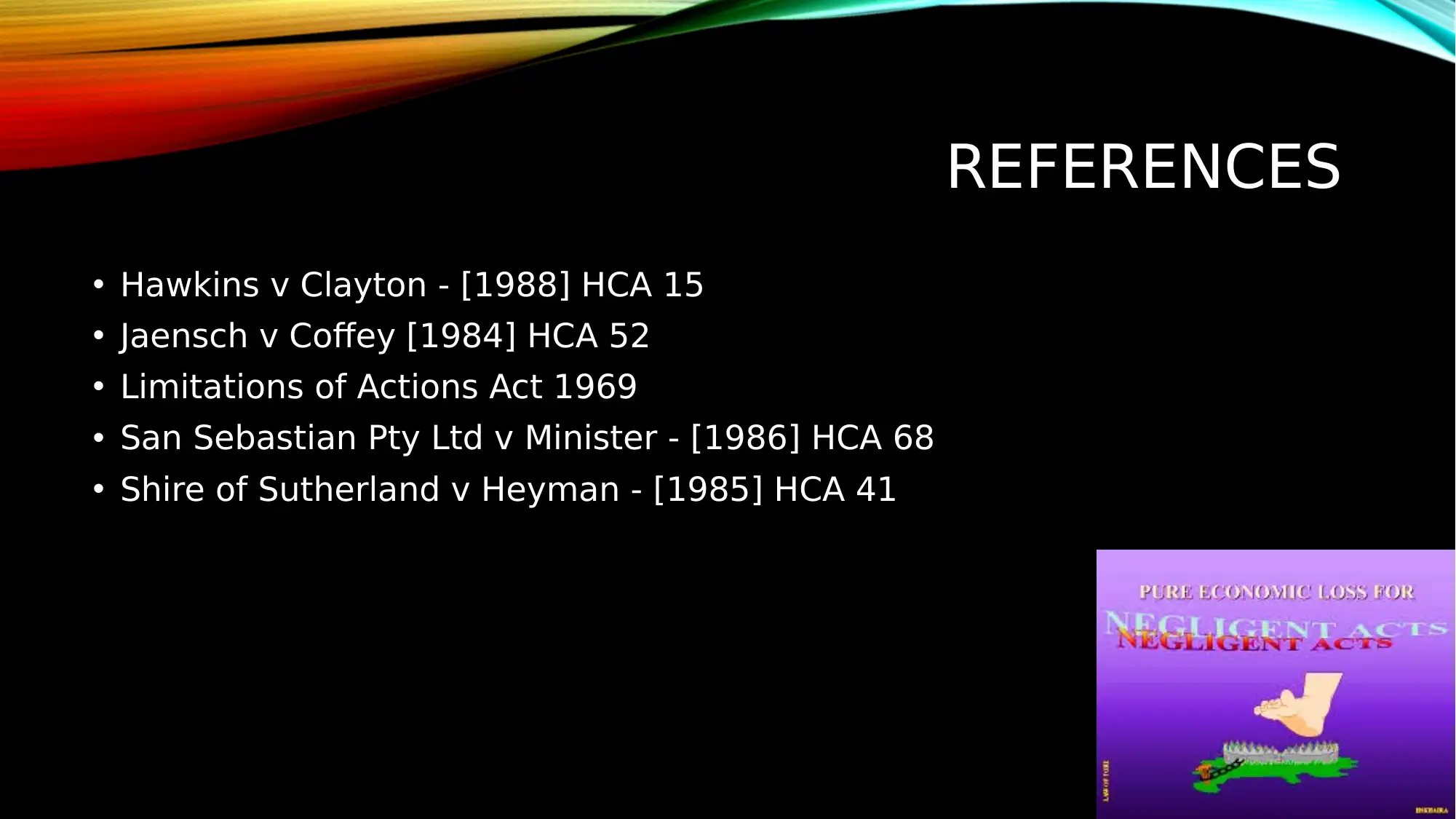
REFERENCES
• Hawkins v Clayton - [1988] HCA 15
• Jaensch v Coffey [1984] HCA 52
• Limitations of Actions Act 1969
• San Sebastian Pty Ltd v Minister - [1986] HCA 68
• Shire of Sutherland v Heyman - [1985] HCA 41
• Hawkins v Clayton - [1988] HCA 15
• Jaensch v Coffey [1984] HCA 52
• Limitations of Actions Act 1969
• San Sebastian Pty Ltd v Minister - [1986] HCA 68
• Shire of Sutherland v Heyman - [1985] HCA 41
⊘ This is a preview!⊘
Do you want full access?
Subscribe today to unlock all pages.

Trusted by 1+ million students worldwide
1 out of 13
Related Documents
Your All-in-One AI-Powered Toolkit for Academic Success.
+13062052269
info@desklib.com
Available 24*7 on WhatsApp / Email
![[object Object]](/_next/static/media/star-bottom.7253800d.svg)
Unlock your academic potential
Copyright © 2020–2026 A2Z Services. All Rights Reserved. Developed and managed by ZUCOL.





